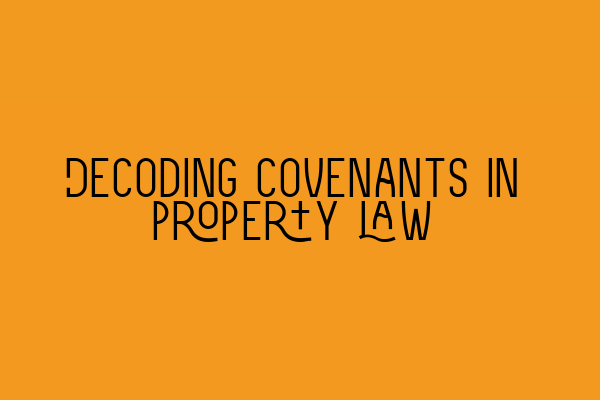Decoding Covenants in Property Law
Welcome to another informative blog post from SQE Property Law & Land Law. Today, we will be delving into the complex world of covenants in property law. Covenants are an essential aspect of property transactions and can greatly impact the rights and obligations of both buyers and sellers. Understanding these covenants is crucial for anyone involved in property law, whether you’re a solicitor, conveyancer, or aspiring property law professional.
So, what exactly are covenants? In property law, covenants refer to legally binding obligations or restrictions that are attached to a property. These obligations can be imposed by the original owner or included in property deeds, leases, or contracts. Covenants are designed to regulate the use and enjoyment of land, ensuring that certain conditions are met by the property owner.
There are two main types of covenants: positive covenants and restrictive covenants. Positive covenants require the property owner to perform certain actions, such as maintaining the property or paying annual fees. On the other hand, restrictive covenants restrict or prohibit certain activities or behaviors, such as building extensions or using the property for commercial purposes.
Now that we’ve covered the basics, let’s dive deeper into some common types of covenants you may encounter in property law:
1. Repair and Maintenance Covenants: These covenants require the property owner to keep the property in good repair and maintain it to a certain standard. They often come into play with lease agreements, where the tenant has the responsibility to maintain the property throughout the tenancy. It’s vital to understand the extent of these covenants and the repercussions for non-compliance.
2. Architectural and Design Covenants: These covenants regulate the aesthetics and design of buildings within a particular area or development. They are commonly found in planned communities or areas with specific architectural guidelines. Breaking these covenants can lead to legal disputes and potential financial penalties.
3. Use and Restriction Covenants: These covenants govern the use of the property and can vary depending on the zoning or planning regulations in place. For instance, a residential property may have a covenant prohibiting commercial activities, ensuring a peaceful and residential atmosphere. It’s essential for property owners to understand these restrictions before purchasing or developing land.
4. Environmental Covenants: With the increasing emphasis on environmental conservation, we are starting to see more environmental covenants being introduced. These covenants aim to protect sensitive ecosystems or natural resources and can include restrictions on deforestation, pollution, or habitat destruction. Understanding these covenants is vital for developers and investors, as non-compliance can lead to significant legal consequences.
Now that we’ve covered some common types of covenants, it’s important to address their enforceability. Enforcing covenants can be challenging, especially if they are outdated or poorly worded. However, in certain circumstances, covenants can be enforced through legal action, injunctions, or the formation of residents’ associations.
To ensure you navigate the complex world of covenants effectively, it’s crucial to consult with an experienced property law solicitor or conveyancer. They can guide you through the intricacies of covenants, helping you understand your rights and obligations as a property owner.
In conclusion, covenants play a vital role in property law, regulating the use and enjoyment of land. Understanding the various types of covenants and their enforceability is crucial for anyone involved in property transactions. Whether you’re a solicitor, conveyancer, or aspiring property law professional, expanding your knowledge of covenants is essential to provide excellent legal advice and ensure optimal outcomes for your clients.
If you’re preparing for the SQE exams and need additional resources or practice exams, check out our related articles:
– SQE 1 Practice Exam Questions
– SQE 1 Practice Mocks FLK1 FLK2
– SQE 2 Preparation Courses
– SQE 1 Preparation Courses
– SRA SQE Exam Dates
At SQE Property Law & Land Law, we are committed to providing high-quality legal resources and support to help you excel in your property law journey. Stay tuned for more informative blog posts and contact us for any property law queries or assistance.
